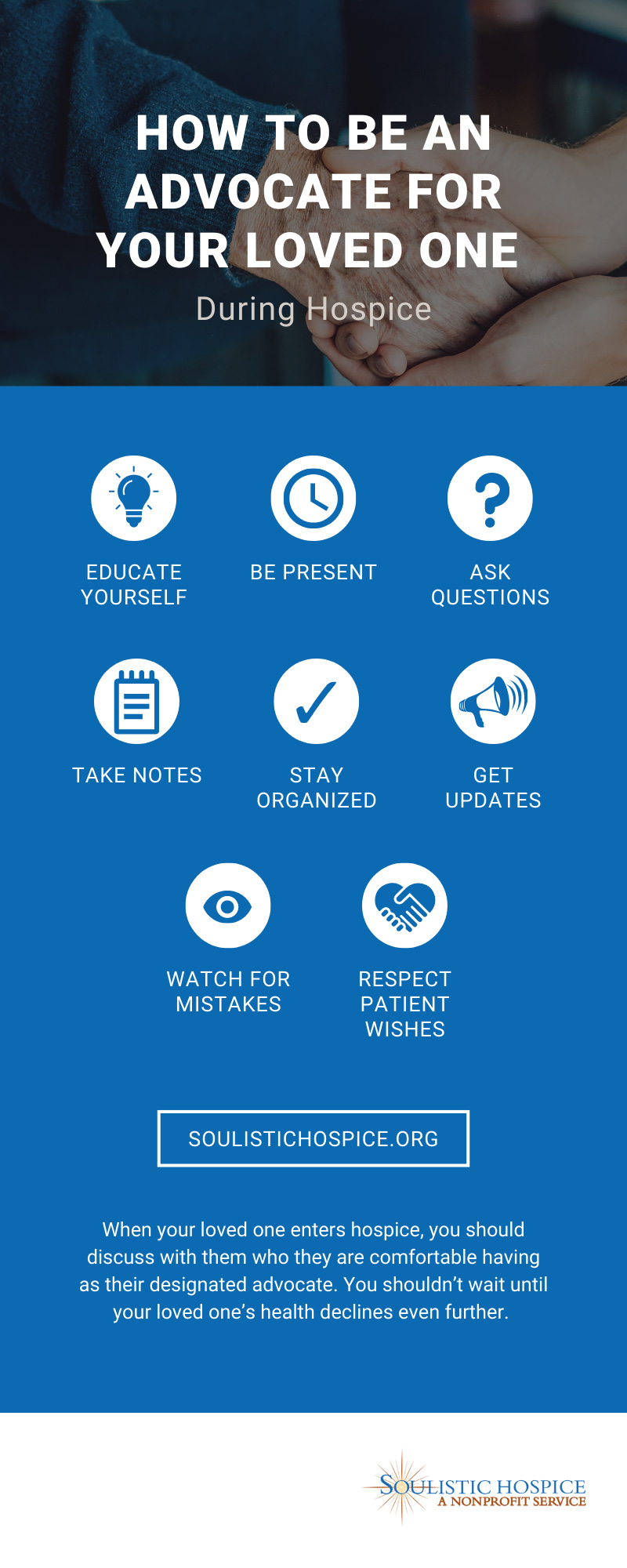
When someone enters hospice care, navigating it can be overwhelming and challenging. Therefore, it’s helpful to have a trustworthy person there to help guide them through the process. That’s where an advocate comes in to assist. Use this comprehensive guide on how to be an advocate for your loved one during hospice.
Why It’s Important To Have an Advocate
Hospice patients typically have a prognosis of six months or less to live, which can be incredibly overwhelming to deal with alone. In addition, when patients reach the end of their life, they can also have decreased mental capabilities, making decision-making more challenging. Therefore, it’s beneficial to have someone who is healthy and clear-minded to help them through the process. This person can also advocate for them during their time in hospice care.
Who Can Be an Advocate
In reality, anyone who the patient trusts can advocate for them, but it is helpful when the patient’s advocate is also their healthcare proxy. A healthcare proxy maintains medical power of attorney, which means they can legally make medical choices for a patient when they are unable to make decisions for themselves. Being a legally recognized advocate also allows them to access medical records, important legal documents, and any other important information that is necessary to have for the patient.
When an Advocate Should Step In
When your loved one enters hospice, you should discuss with them who they are comfortable having as their designated advocate. You shouldn’t wait until your loved one’s health declines even further. It’s best to choose an advocate when you know your loved one is entering hospice care. That way, they have someone to be by their side through every step of the process. The end-of-life process can be stressful and frightening for patients, and having an advocate to help them through medical and legal processes is essential.
How To Advocate for Your Loved One
There are several things you should do when you are acting as an advocate for your loved one during their time in hospice care. Here are some examples of things to keep in mind as you step into an advocate role for your loved one.
Educate Yourself
First and foremost, as an advocate, you should educate yourself. It’s crucial that you educate yourself on your loved one’s diagnosis and condition so you know exactly how to handle their care. You’ll also want to learn more about hospice care in general and your loved one’s specific care plan. In addition, you should find out their daily routines in hospice so that you can advocate accordingly. Then, you’ll also want to educate yourself on the necessary financial and legal matters related to end-of-life planning.
Be Present
The second way you can advocate for your loved one in hospice is by being present. One of the main components of being an advocate is showing up for medical appointments, exams, and any other necessary appointments or meetings they may have. First, you’ll need to make sure that your loved one is comfortable with you showing up to those appointments. Once you get their permission, you should accompany them to each doctor’s appointment, exam, or procedure that they need to attend.
Ask Questions
Asking questions is another way that you can advocate for your loved one. Your loved one may feel overwhelmed by all the information they are taking in at this time, so it’s helpful for you to ask some of the important questions. If any information is unclear or confusing, you should ask the doctor or medical professional to explain it again in a way that you can understand. Ask about treatment plans, schedules, medications, side effects, and other pertinent information you need to understand to best take care of your loved one.
Take Notes
The fourth way that you can help your loved one through the hospice process is by taking notes. Any time you go to appointments with your loved one, you should jot down essential information so that you don’t forget it. Make notes of schedules, medications, dosages, potential side effects, instructions, and anything else you need to remember. These notes will help you and your loved one know what steps to take during their time in hospice.
Stay Organized
Staying organized is another essential element of acting as an advocate for your loved one. When a patient is in hospice care, a lot of information can get thrown at you both, and it’s essential to keep everything in a place where you can easily access it. Make sure you organize important medical and legal documents, medications, instructions, appointment schedules, etc.
Get Updates
As you advocate for your loved one during their time in hospice, it’s necessary that you get regular updates on their health and treatment plan. Depending on your specific schedule, you may not get to see your loved one every day. Therefore, it’s essential to schedule regular phone calls with either them or their hospice caregivers so you can make sure they are doing OK. It’s important to know if they have any changes in health, medication, routine, or any other modifications.
Watch for Mistakes
Watching for mistakes is another vital thing to remember as you advocate for your loved one during hospice. Unfortunately, sometimes errors occur during healthcare practices. Therefore, as your loved one’s advocate, you should be on the lookout for any mistakes that could happen.
For example, ensure your loved one receives the correct medications at the correct doses. Make sure that medical professionals are not making any errors as they care for your loved one because they could be detrimental if unnoticed.
Respect Patient Wishes
Last but most certainly not least, you should ensure you respect the patient’s wishes. As an advocate for your loved one, one of your primary responsibilities is making sure that you and the medical staff are following the wishes of your loved one. Again, it’s helpful if your loved one has filled out an advance directive and chosen a medical power of attorney. An advance healthcare directive provides an outline for your loved one’s wishes regarding their care, and healthcare power of attorney allows a trusted person to make important medical decisions for them when necessary.
Now that you know how you can advocate for your loved one in hospice care, you can use these tips to help you through the process. Soulistic Hospice offers hospice medical care in the greater Tucson area if you or your loved one are searching for a trustworthy facility.









